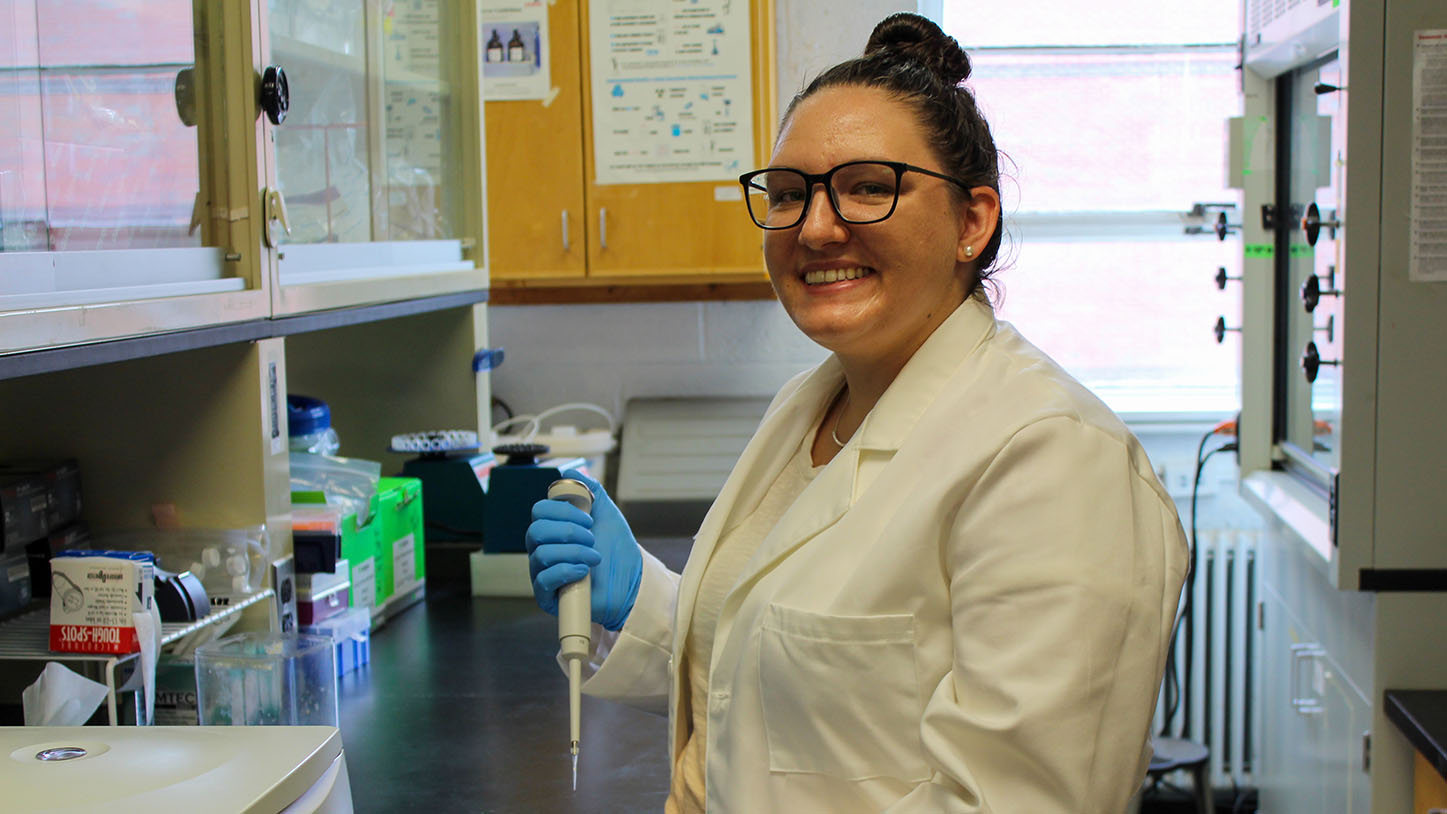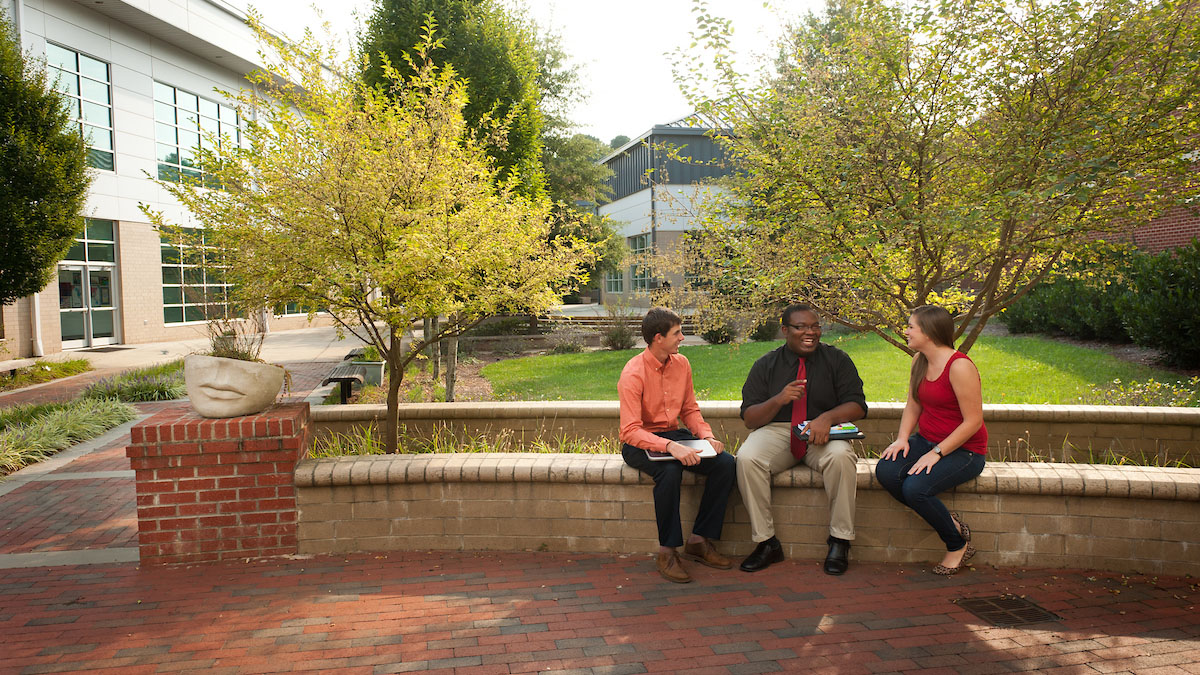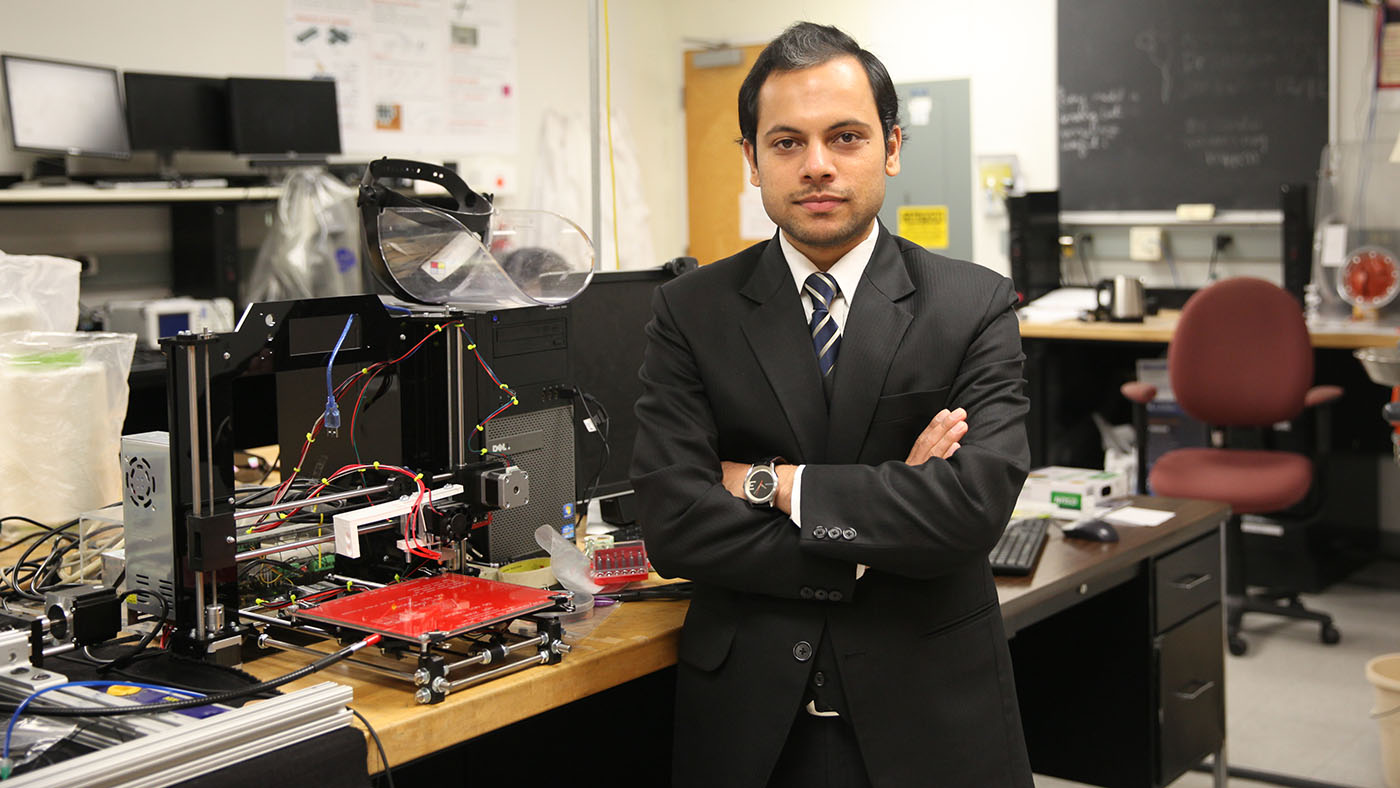Transcript:
Shannon Madden
Alright, welcome everybody. This is Grad Pack Talks, a podcast that focuses on resources, experiences and strategies for success from graduate students at NC State University. I’m Shannon Madden.
Jai Jackson
I’m Jai Jackson.
Shannon Madden
And we’re here with Emily Meyers, a doctoral student in the Department of Entomology and Plant Pathology here at NC State. Welcome, Emily.
Emily Meyers
Hi, thanks for having me.
Shannon Madden
Thanks for coming. So in this episode, we’re talking about writing at the graduate level. One of my favorite topics.
Jai Jackson
So Emily, can you tell us about yourself, a little bit about your degree program, and what brought you all the way down to NC State?
Emily Meyers
I started learning about agriculture and plants and animals. Then I went on to get a bachelor’s degree in Biology at Ripon College, a really small school in central Wisconsin. And on my summer breaks while in undergrad I did some internships involved in plant science and plant pathology, and eventually applied to grad school and ended up here at NC State in plant pathology. [NC State] is a great place for plant pathology. Actually a lot of diseases occur here, and we have great connections with the industries in Research Triangle Park.
Shannon Madden
Great. It’s always so interesting to hear what led people to their research interests. So what are you writing right now?
Emily Meyers
Right now I’m working on the second research chapter of my dissertation. It’s on fungicide sensitivity of one fungus that affects wheat plants. The fungus is wheat powdery mildew and my project or my paper on that is basically a screening of like 400 isolates collected in the U.S. And looking at how good two different types of fungicides work at controlling this fungus across the U.S.
Shannon Madden
So your dissertation, instead of being a single study, is several articles.
Emily Meyers
Yeah. So it’ll be three articles.
Shannon Madden
And is the first one already out, or what’s the first chapter?
Emily Meyers
Yeah, the first chapter actually just got accepted and is currently available online.
Jai Jackson
[whooping]
Emily Meyers
It should be out in actual, like, publication format in a couple months, probably. So yeah, I’m excited to have that one done.
Note: Emily’s article was revised in the Graduate School workshop development series, Writing for Journal Article Publication (Spring 2019).
Shannon Madden
Great. Yeah, that is exciting. Congratulations!
Emily Meyers
Thanks.
Jai Jackson
So do your parents have it hanging on the refrigerator?
Emily Meyers
Um, I don’t know if they actually printed it out. I did send them the link to it.
Jai Jackson
So we all have a process when it comes to writing. Some of us do it at night; some of us do it in the tub. What is your writing process?
Emily Meyers
For me, I really like to kind of start with an outline and get all the topics that I want to cover within that section or that paper, written down physically a piece of paper. That really helps me get my ideas together. Then I just kind of start with subheadings and fitting the different topics underneath those subheadings. And then I just try to just write it out and get it out there and then go back and fix transitions and sentence flow and that kind of stuff afterwards.
Shannon Madden
And where—geographically—do you write? Writing space can be so important in terms of the process. So what does your writing process physically look like?
Emily Meyers
Yeah. I do have a nice office. But my office since I used it so much when I was in like doing lab work and it’s so (in proximity) close to my lab, it’s more of a nuisance to be in there while writing because I just end up talking to people or helping people with things that I don’t need to be helping with. So it’s really better for me to find a corner somewhere in a library or in Talley [Student Union], or a coffee shop, and just get into my own space there to be able to write.
Jai Jackson
So you’ve talked to us about what you do and the spaces that that work best for you. So what have you found that are the major hindrances to your writing? So what keeps you from being able to actually be productive?
Emily Meyers
For me, it’s usually, just myself. I just get caught up in you know, there’s so many things just to manage a project. And a lot of it is just emails. I’ll just spend so long continually doing emails. So really it helps me too to silence my phone and put it away and don’t have my email open at all on my computer, to actually get things done. For me, the process really needs to be with the outline, to really get started because if I just say I’m going to go write, it doesn’t really work. I need to be like, I’m going to write this introduction on this. And then I have it in my mind that that’s going to get done. Not just, I’m going to write something for an hour today.
Shannon Madden
That’s nice that that works for you. I often find that outlines for me personally can be counterproductive. Well, I don’t want to say counterproductive. But I sometimes will think, oh, here’s how I’ll outline the article or the paper or whatever. And it seems so clear in the outline. And then when I go to write it, I think oh, gosh, this is not at all . . .
Emily Meyers
. . . how it’s flowing?
Shannon Madden
Right!
[laughter]
Shannon Madden
Just because I know what I’m supposed to put in this section doesn’t mean that that’s right, or that it’s, you know, the logical place to go. I don’t know; it can be so hard with outlines I think, so it’s nice that that works for you.
Emily Meyers
Yeah, I think I think for me, since in the natural sciences, and for articles, it’s so like clear cut what has to be in each section. And then I have the data that I have, And . . . that’s what I have. So I know what data I have to put in each section. So it’s kind of like, this one needs to go here. This is what I have to go there. And I don’t really have much else to put there. So nice. Where for other Yeah, where it’s more just like argumentative writing, that I could see how that would not be helpful in doing an outline. Yeah.
Shannon Madden
Well, sometimes I do outlines in reverse. So I’ll write a draft of something first, and then I’ll go back through and sort of pick out, here’s what I said in this section; here’s what I said in this section. That helps me see the arrangement and then see what needs to come next. But I don’t know, it’s always such a recursive process; you know, it’s back and forth.
So we’re thinking about writing at the doctoral level. You’re a doctoral student, if you look back on your writing as an undergraduate, how would you say what you’re doing now is different from writing projects that you might have had as an undergraduate student?
Emily Meyers
I think in undergrad things were more—writing projects were more clear cut, more defined. They had a more direct prompt on what you should be writing. Where writing my own research article is just very open ended and unclear on what I should be writing exactly. Because in undergrad, you will get a project and it would be, you know, impressive to have a whole bunch of citations in it. And now it’s like, of course there are citations in it. And you have to have like the right people cited in it.
Jai Jackson
I think about in undergrad, I focused so heavily on quantity. You started talking about the number of citations and whatnot. It was always, all right here’s this twenty page paper, and faculty were like, you have to hit twenty pages.
Emily Meyers
Yeah.
Jai Jackson
So I B.S.-ed my way to twenty pages.
Emily Meyers
Right. True.
Jai Jackson
But here in the doc program, it’s quality over everything. You could have a, I mean I’ve seen people with 72-page dissertations and the quality is so well-focused that it works.
Emily Meyers
Right.
Jai Jackson
Whereas then you get someone who’s long-winded like me.
Emily Meyers
So for me, I think in undergrad, the writing prompts were more clear and direct on what you’re supposed to be writing about and in graduate school, it has been more open ended, to just write a research article and that’s what you’re told to do. It is very different than to write a five page paper that has ten citations and that kind of thing. So it’s just a very different process of knowing what all needs to be included and how to go about that process.
Shannon Madden
Which is interesting, right? Because if you’re writing about the experiments that you’re doing in the lab, theoretically it seems like there should be a clear recipe, right? Like when you were talking about your outlines, you said that it’s clearly defined what should come in every section. So It’s interesting to hear you say that writing at the graduate level is more complex and less defined. And I think you’re right. But I wonder why that is.
Emily Meyers
Yeah, I think for me, too, there’s just pressure. Because when you are the one that did the experiments, it’s just way different than citing, someone else did these. And now you’re the one responsible for that data. And you’re the quote unquote, “expert” on that. And it’s just a lot of pressure to get it written up correctly and to not write something that isn’t true, so that others try to follow it and it’s not what you actually meant.
Shannon Madden
Yeah, for sure. And the high stakes nature of the dissertation, right? The dissertation determines whether or not you get the degree. So that—at least for me, when I was in a Ph.D. program—was definitely, you know, a hindrance.
Emily Meyers
Yeah, it’s a lot of pressure that just doesn’t really—I mean, we all kind of know it’s there but it’s not really talked about.
Jai Jackson
So we all have our “A-ha” moments when it comes to writing. Some of us determine that we can write well, in certain spaces and other places. For me, my major professor wrote his entire dissertation between the hours of 3 a.m. and 6 a.m. in Waffle Houses. And It’s like, that was the most productive place for him. So could you share with us, what’s been your biggest epiphany as a graduate level writer?
Emily Meyers
For me, it’s really been a learning experience, especially over the last few months is just to, like, let the writing happen and tell myself that it doesn’t need to be perfect the first time or the second time, or even the final draft doesn’t need to be 100% perfect, because there’s still going to be reviewers and edits after that. So really just enabling myself to write and letting it be, is important for me.
Shannon Madden
That’s such a great point. I mean, writing by its very nature cannot ever be perfect. There are a million ways to arrange any given sentence or any article. So letting go of that, you know, pressure for it to be perfect sounds really productive.
Jai Jackson
Let it go, let it go.
Shannon Madden
Yeah. You talked a little about reviewers, and especially I imagine working in a lab lends to a more collaborative focus on writing. How have you navigated collaborating with peers and colleagues on big writing projects?
Emily Meyers
Yeah, so actually, not only do I work in a lab with multiple people working on the same project with me, I also have a big collaboration project with a lab from the United Kingdom, and from Australia.
Shannon Madden
Wow.
Emily Meyers
And we’re all gonna, that’s what my third dissertation chapter is supposed to be this big, collaborative article. So communication is key. And it’s trickier being in different time zones, because I often just like wake up to emails from overnight. So It’s a lot of sending emails; waiting on emails. And for me, it has really just been like, being patient, and communicating as much as I can. And being clear about what I’m writing, what I think they’re expected to write, what data I’m providing, what data they’re providing, and just making sure we’re all on the same page before we get too far, where it gets too confusing to combine all our information.
Jai Jackson
That is, I’m sorry, I was just going to say that’s very interesting, because that leads to my next question of, what do you do when there is a misunderstanding? What happens when someone feels like they have contributed more than others, and they want to be first author versus second and whatnot?
Emily Meyers
Yeah, I mean, I haven’t quite had that experience. Basically, for this chapter, I was kind of told that I will be first author, since it will be part of my dissertation. It just so happens that the other two labs don’t have a graduate student actively on the project; it’s more like postdocs and technicians, and the PIs [principal investigators]. So I’m the only grad student on the project. So basically I did most of the work; I’m going to do basically all of the writing. And now it’s just me managing the information from all the people, which has been a challenge, but it’s basically just a big spreadsheet of different columns like U.S., U.K., Australia, and checkboxes of what they have, what they’re still working on, and what, how it’s gonna be written up. So yeah.
Shannon Madden
Yeah, file management and document management seems like such a big part of the process and a part of the problem for writers.
Emily Meyers
Yeah, Definitely. Yeah, it’s just been like a giant spreadsheet with multiple tabs of data. And then one of the tabs is just like overall, what do we have in this document? And it just gets kind of passed around.
Shannon Madden
Yeah, wow. Sounds Nice. Sounds useful. So if you’re thinking about the work you’ve done as a doctoral student here at NC State, or I guess, in general, what resources would you say have been most beneficial to you as a writer in your graduate program?
Emily Meyers
For me, I really struggled with writing in the beginning of my graduate degree. I wasn’t really making a lot of progress and didn’t really make the time to write and it always just kept falling to the bottom of my to-do list. Because I had classes and lab work and lab classes and TA-ing [teaching] to do so it just kept falling to the bottom. So for me, I really needed things like the [NC State Graduate School’s] Writing Accountability Group really helped me just to have somewhere to check in every week to say, I’m going to do this, this week; this week is going to be this topic or this assignment. And then to check in at the end of the week, and say either you did that, or you didn’t quite get that all done is important, just to check a box for me, kind of. And then I also took the [NC State Graduate School’s] writing workshop for writing articles. And that one really help me finish up that first dissertation chapter. So that was really productive in getting me to finish that paper and have drafts that my advisor could edit with me.
Shannon Madden
And the article is forthcoming, you said, right? It’s already basically published.
Emily Meyers
That one is online, in a weird format. But it is like in not an organized form; it’s just a big PDF of what I wrote. But yeah, it’s out there.
Shannon Madden
Nice! Good success story from that workshop.
Emily Meyers
Definitely.
Jai Jackson
So as a successful graduate writer, it’s always best to pass on advice and leave a legacy of support. So what advice would you give to more junior graduate students who are about to embark on a similar dissertation process as yourself?
Emily Meyers
I think from what I learned and what I just said, too, is really keeping it on your to-do list even in the beginning years of grad school. Don’t leave it all towards the end. And just have someone—if it’s your advisor, or a co worker, or another grad student, or even like your, you know, significant other—who you are accountable to, to just like turn in whatever writing you have, even if it’s just like a paragraph for the week. And to just write those methods. If you’re doing an experiment, you know what you did—write it down now. Then at least you have something written down for when you’re going to write that paper at the end of your dissertation writing.
Shannon Madden
So starting early, doing it every day, being accountable to a group. What would you say in answer to that question, Jai? What advice would you give junior graduate students? You wrote a dissertation.
Jai Jackson
Whoa. That was decades ago, or so It feels. I’d say the best advice that I would give is to use the resources available to you. Don’t recreate the wheel. So if there’s writing support on your campus, use the resources. If there are accountability groups, as Emily stated, use them as resources. I always push my students to realize that they don’t need to write a dissertation in a day. Break it into small chunks. So don’t look at it as one big document, but just a collection of papers.
Shannon Madden
It’s probably impossible to write a dissertation in a day.
Jai Jackson
I don’t know; I’d be up for the challenge.
Shannon Madden
It would be quite the 24 hours.
Jai Jackson
Waffle House is open 24 hours. I could do it.
[laughter]
Shannon Madden
So Emily, You won’t be in your doctoral program forever.
Emily Meyers
Yeah.
Shannon Madden
That’s a good thing.
Emily Meyers
Hopefully.
Shannon Madden
You definitely won’t be. So what are your aspirations as a researcher, or what do you want to be known for as a writer and a scholar? Not just in graduate school, but beyond—like, for your whole career?
Emily Meyers
Yeah, that’s a hard question. Um, I mean, I think that as a plant pathologist, we’re supposed to, like, in the big picture, strive to like, you know, solve world hunger and all this stuff. But that’s not really like, To me, that’s not a possible goal for myself. That’s a, you know, worldwide goal. For me, I’d rather just be known for my hard work and determination and putting the effort in where it needs to be.
Shannon Madden
Yeah, and your research on wheat fungus will definitely go towards the world hunger problem.
Emily Meyers
It does. It does help. It does not—it’s not directly, but it will, it will help. Yes.
Shannon Madden
So we wanted to remind you all again, there are resources at NC State, for writing and to support you as a writer. The workshop that Emily mentioned, Writing for Journal Article Publication, is hosted through the Graduate School every semester. We also have several one-off writing workshops on things like writing introduction sections, writing literature reviews, methods, creating figures and graphs, and other aspects of the writing process that are more psychosocial like avoiding imposter syndrome, professional networking—the other aspects of the process that, you know, come into play, and determine whether or not you can get out of bed in the morning and go to the lab, and go to work and write. How you feel about yourself makes a big difference in that regard. We also have accountability groups, as Emily said; she found those very helpful. This fall, we’re starting a new WhatsApp™ accountability group where students will work in small groups to keep each other motivated and moving on big writing projects. We’ve got the Graduate Writing Center in Park Shops is a great resource where you can go and get one-on-one consultations on your writing. You can reach out to me, Shannon Madden, in the Graduate School, I’ll be happy to work with you. We’ve got targeted support for the College of Engineering, led by Dr. Katie Homer, we’ve got a ton of resources, and we are here to support you. Jai, any final thoughts on writing at the graduate level?
Jai Jackson
I would say write something every day. It doesn’t have to be an academic paper; it could be a journal. It could be a post to your blog. But the more that you write, the easier it will become. And if you struggle with writing, and being able to, feeling comfortable with writing at the graduate level—imitation is the best form of flattery. Read the articles, read the contributions of writers who you aspire to be like, and through reading their materials, you’ll learn how they use words, how they put sentences together, and it’ll help. So reading and writing. They’re both fundamental.
Shannon Madden
I would say collaboration, too. Definitely during my PhD program, I had some of the best successes of collaborating with other peers. And as I went to my first tenure track faculty job out of graduate school, those collaborations were invaluable because the people that I was working with, were keeping me moving toward tenure and keeping me going even when I was managing other things like service, and teaching, and navigating a new institutional context, being away from my family and friends. So those collaborators really made a difference for me personally, and I’m not even in the sciences.
So thanks again, everyone for joining us. Again, this is Grad Pack Talks. Emily, we really appreciate you being here.
Emily Meyers
Thank you.
Shannon Madden
And we will see you all next time.
- Categories:



